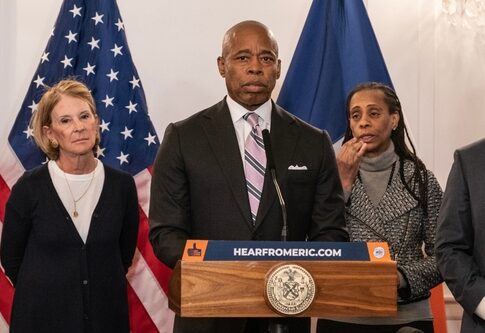Mayor Eric Adams faces fierce opposition from local officials and residents who claim the Bronx is being unfairly targeted. This migrant crisis move highlights the delicate balance between fulfilling legal obligations as a sanctuary city and addressing community concerns. How will the new Bronx shelter impact residents and businesses?
Controversy Erupts Over Bronx Migrant Shelter
New York City’s announcement of a new 2,200-bed migrant shelter in the South Bronx has sparked outrage among local officials and residents. Democratic Congressman Ritchie Torres led the charge, accusing Mayor Eric Adams of using the Bronx as an immigrant “dumping ground.”
The controversial decision comes as part of a larger plan to close 46 migrant shelters citywide, reducing the total bed count by 10,000 by June. This move coincides with the closure of the Randalls Island tent shelter and other facilities, aimed at saving taxpayer money and addressing the ongoing migrant crisis.
What does a smart, hip, educated urban progressive do after being swamped with all the illegal aliens he could ever wish for?
Ship them to The Bronx, of course.
==========================City officials are prepping an old South Bronx storage facility for up to 2,200 "migrant"… pic.twitter.com/oNoAD18g5W
— Crime In NYC (@CrimeInNYC) January 15, 2025
Bronx Residents Express Safety Concerns
The new shelter’s location near “the Hub,” an area known for drug activity, has raised serious safety concerns among Bronx residents. Torres voiced these worries, stating, “Instead of decisively dismantling open-air drug markets in the Hub, the City is treating the South Bronx as a dumping ground for an endless stream of shelters.”
Retrofitting the Bronx shelter will cost between $250,000 and $340,000, adding to the financial burden on taxpayers. The facility, owned by SoBro Local Development Corp., has become a focal point for discussions about the fair distribution of migrant shelters across the city.
NYC closes 7 more migrant shelters as influx slows — but 56K asylum seekers still in city system https://t.co/RnMvIRyZGO pic.twitter.com/wx3sB1Zyhh
— New York Post (@nypost) December 1, 2024
City Officials Defend Shelter Strategy
Liz Garcia, spokesperson for Mayor Adams, defended the city’s approach, emphasizing the overall reduction in shelters and tax burden. She stated, “The bigger picture here is we’re closing 46 migrant sites, we are reducing our bed count by 10,000 beds across the city, not just the Bronx.”
New York City, a sanctuary city with a “right to shelter” law, claims successful asylum seeker management and federal policy changes have reduced the number of people in shelters and associated costs. The closure timeline for the Bronx shelter remains uncertain, dependent on future migrant census numbers.

